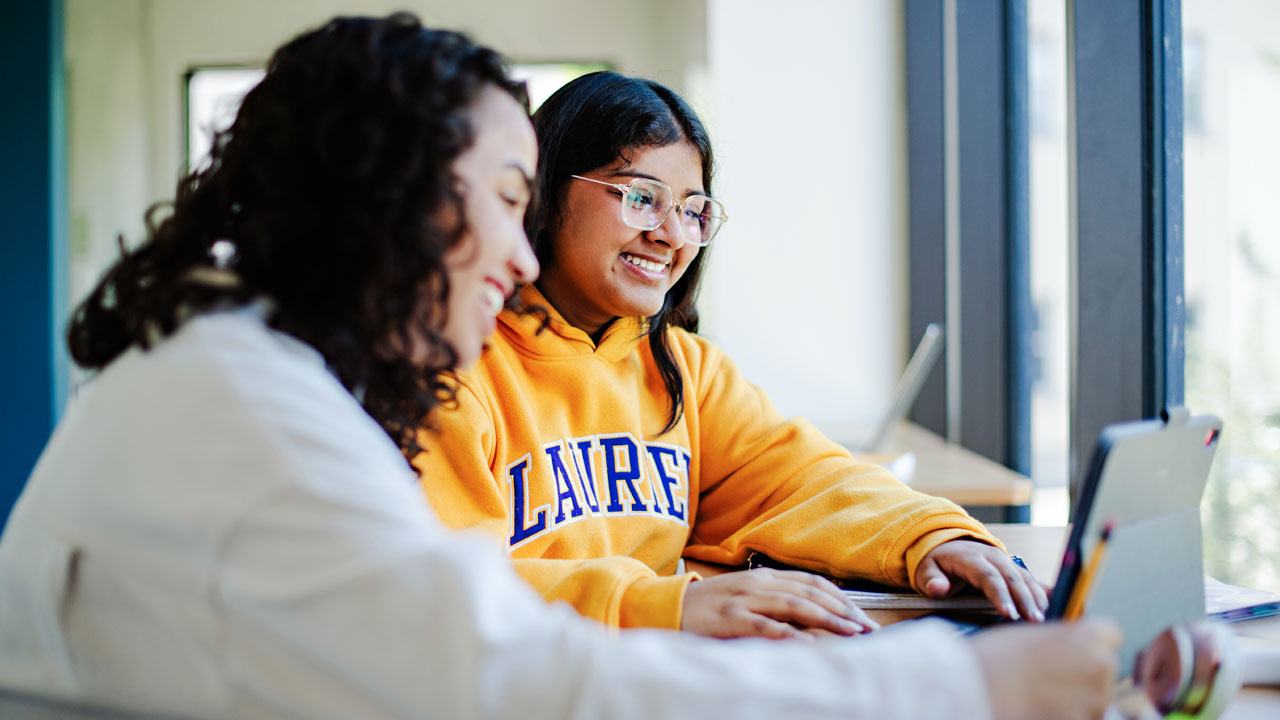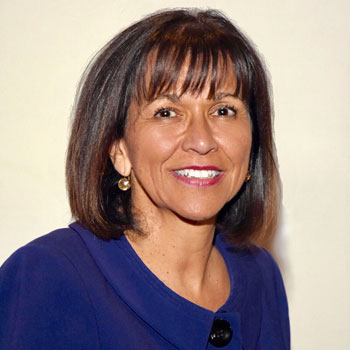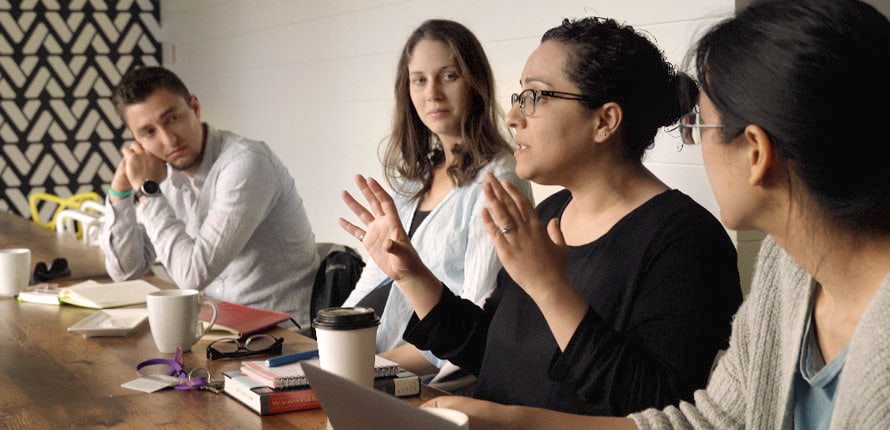Search for academic programs, residence, tours and events and more.
Wilfrid Laurier University's PhD in Educational Studies brings together expert faculty members with emerging researchers dedicated to using interdisciplinary theories and methodologies. We are passionate about generating new knowledge capable of driving positive, human-centered educational change.
Graduates of this program will be well equipped to critically examine and transform educational structures, policies, and practices across contexts and the lifespan, and will be ready to lead in academia and various educational roles.

Full-time and flex-time options.
Conveniently scheduled in-person hybrid program.
Strong integration of interdiscipinary theory and practice.
The PhD in Educational Studies program at Laurier is offered through an in-person hybrid delivery model, with both a full-time enrolment option (with up to four years of funding) and a flex-time enrolment option (self-funded with the opportunity to enrol part-time post-candidacy).
During the pre-candidacy period, PhD in Educational Studies students complete coursework, establishing theoretical and methodological foundations. Students complete six 0.5-credit courses: two foundational courses (EU801, EU802), three advanced seminars (EU803, EU804, EU805), and at least one elective course.
A crucial milestone for all students is the Comprehensive Portfolio and Dissertation Proposal (EU898), which includes a written document and an oral presentation. Its successful completion formally grants candidacy status.
During candidacy, the primary focus shifts to independent research and the completion of the doctoral dissertation (EU899). This involves securing ethical research clearance or exemption, undertaking source and data collection and analysis, and finally, writing the dissertation.
A working chapter of the dissertation must be submitted for review, typically in term 8 or 9 for full-time students, or between term 8 and 12 for flex-time students.
The program culminates in a successful public oral defense of the dissertation, which is expected to be an original and significant contribution to the field. Flex-time students have the flexibility to extend their dissertation work for up to two additional academic years as part-time students.
Graduate faculty in the Faculty of Education at Laurier possess diverse and interdisciplinary research interests, collaborating with researchers from across the world and contributing to a rich academic environment. Their expertise spans a wide range of educational contexts and areas of inquiry, from early childhood education, through K-12, to postsecondary education and lifelong learning, and includes various research methodologies. You are encouraged to check out our faculty profiles to learn more about our areas of research focus.
Our program is enhanced by a number of related research centres and groups, including:

"Through innovative coursework, personalized research plans, and strong research mentorship, you will develop the expertise needed to contribute original scholarship that shapes educational theory, practice, and policy."
Maria Cantalini-Williams, dean of the Faculty of Education
Take the first step in your graduate education and apply to one of our graduate programs. Follow our three-step admission process — we’ll walk you through how to apply and prepare for your first day as a graduate student.
Embarking on a doctoral journey is a significant step, and our PhD in Educational Studies program is designed to attract passionate, research-oriented individuals like you.
Here's what we look for:
If you are an unconventionally prepared applicant, the Faculty of Education at Laurier is deeply committed to social justice, equity, and inclusion and we welcome your application! In partnership with the Faculty of Graduate and Postdoctoral Studies, we offer alternative admission pathways. This means we can consider individuals who may be unconventionally prepared, particularly from Indigenous communities and other equity-deserving groups, based on their potential for academic success and their unique contributions to the diversity of our student cohort. This approach ensures a vibrant and multifaceted learning community.
If you are an international student applicant, the Faculty of Education welcomes you to the PhD in Educational Studies program. International students who have confirmed funding from a third party, such as their employer or a scholarship program in their home country, will be considered for admission.
You will apply for the PhD in Educational Studies through the Ontario Universities Application Centre (OUAC). After you have submitted your OUAC application, paid the non-refundable application fee, and Laurier has received your application, you'll receive an email from gradadmissions@wlu.ca advising you to upload the additional required documentation to Laurier’s Online Registration and Information System (LORIS).
Note the application process and the uploading of supplemental documentation, which includes references, typically takes two weeks. To avoid disappointment, please apply early.
An application for admission to our PhD program in Educational Studies must include:
Proficiency in written and spoken English is essential to graduate studies at Laurier. Applicants whose language of instruction during their previous postsecondary education was not in English must submit evidence of proficiency in English. If applicable, results from accepted testing services must be uploaded to LORIS.
Contact Mary Wilson, PhD program officer, at mwilson@wlu.ca or Kristine Dyck, graduate program coordinator, at eduphd@wlu.ca.
Regardless of the type of graduate degree program you intend to pursue, financial planning is important. At Laurier, we want to provide you with as much information as possible about a variety of scholarship and funding opportunities and equip you with the skills to manage your finances effectively in the years to come.

Graduates will be prepared for positions as academic leaders, researchers and faculty members, as well as for professional roles in the fields of student affairs, curriculum development, educational development, or other forms of educational leadership across public and private K-12 school systems, universities, colleges, and adult, continuing and professional education.
ASPIRE is Laurier's professional skills development training program for graduate students. The program helps you craft an individualized, extracurricular learning plan tailored to your professional journey and entry to the workplace.
Learn about the interests and ongoing research of our faculty members. If their research interests you, email the professor directly to set up a meeting. Include information about yourself, your skills, your experience, and why you’re interested in their research.
Maria Cantalini-Williams
Professor
Kathleen Clarke
Assistant Professor
Ardavan Eizadirad
Associate Professor
Sofia Ferreyro Mazieres
Assistant Professor
Jennifer Holm
Associate Professor
Julie Mueller
Professor
Ryan Neepin
Assistant Professor
Tara-Lynn Scheffel
Associate Professor
Steve Sider
Professor
Jennifer Straub
Assistant Professor
Mary Wilson
Associate Professor
Think this is the perfect program to continue your education?